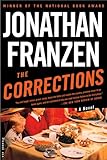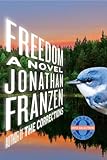 Nearly ten years ago, I interviewed Jonathan Franzen, then primarily known less for his fiction—he’d published two great but largely unread novels—and more for a brilliant, cranky essay on writing (and reading), generally referred to as “the Harper’s Essay.” Over the course of a day, Franzen talked, with unflinching honesty, about the difficulties—and exhilarations—of writing The Corrections, which was due to be published three months hence. He had, he explained, become so consumed with writing a “big” novel, an important novel, that he spent years writing and discarding chapters, plot threads, characters, perpetually unsatisfied. His frustrations and ambitions rang eerily true for me, for numerous reasons, not the least of which being that I was working on a novel that, I knew, would be large in scope, so large that I began to hyperventilate when I allowed my mind to linger too long on it.
Nearly ten years ago, I interviewed Jonathan Franzen, then primarily known less for his fiction—he’d published two great but largely unread novels—and more for a brilliant, cranky essay on writing (and reading), generally referred to as “the Harper’s Essay.” Over the course of a day, Franzen talked, with unflinching honesty, about the difficulties—and exhilarations—of writing The Corrections, which was due to be published three months hence. He had, he explained, become so consumed with writing a “big” novel, an important novel, that he spent years writing and discarding chapters, plot threads, characters, perpetually unsatisfied. His frustrations and ambitions rang eerily true for me, for numerous reasons, not the least of which being that I was working on a novel that, I knew, would be large in scope, so large that I began to hyperventilate when I allowed my mind to linger too long on it.
Franzen, of course, found his way out, in part, he explained, by turning away from the sorts of big novels he tended to favor, as both reader and writer, and toward the more slender volumes on his shelves, the Gatsbys and suchlike. Ultimately, he conceived of The Corrections, less as one massive tome, and more as a series of smaller novels. Franzen’s cure, in a way, became my own. I didn’t put down those big social novels, but I did look at them in a different light, as a series of component parts, and a few months later my own novel began to slide into place.
 This fall, like everyone else on the planet, I burned dinner, let my two-year-old cry, stopped answering the phone, and missed any number of subway and bus stops, as I completely gave myself over to Freedom. But I was also, in a neat coincidence, starting work on my own second novel, an even larger and more nerve-wracking endeavor than the first, and so I found myself thinking about that long-ago interview—the advice he’d unknowingly doled out—and picking up some of the shorter novels on my bookshelves, including many old favorites, such as Thomas Pynchon’s The Crying of Lot 49 and Laurie Colwin’s Family Happiness, both of which I re-read every year or so, marveling at their perfection, and Jean Rhys’s 1928 novel Quartet, which I’d not so much as glanced at since I was about 23.
This fall, like everyone else on the planet, I burned dinner, let my two-year-old cry, stopped answering the phone, and missed any number of subway and bus stops, as I completely gave myself over to Freedom. But I was also, in a neat coincidence, starting work on my own second novel, an even larger and more nerve-wracking endeavor than the first, and so I found myself thinking about that long-ago interview—the advice he’d unknowingly doled out—and picking up some of the shorter novels on my bookshelves, including many old favorites, such as Thomas Pynchon’s The Crying of Lot 49 and Laurie Colwin’s Family Happiness, both of which I re-read every year or so, marveling at their perfection, and Jean Rhys’s 1928 novel Quartet, which I’d not so much as glanced at since I was about 23.
 Brief, brutal, and mildly baffling, Quartet follows a young—or, well, young-ish—former chorus girl, Marya Zelli, over the year following her Polish husband’s imprisonment for theft. Left in Paris with no money and no real way of making a living—she hails from shabby genteel English stock—Marya sells everything she owns, falls ill, and is taken in by the Heidlers, a wealthy British couple whose interest in her stems, she soon discovers, from the husband’s desire to make her his mistress. It’s not giving much away to reveal that she succumbs—you know she will from the moment they meet—because the real pleasure of the novel lies less in the plot (there isn’t much of one) and more in Rhys’ dark humor, unsparing accounts of Marya’s existential despair as she wanders “like a grey ghost…in a vague, shadowy world,” and genius for portraying a character with the smallest and most specific strokes (Lois Heidler, clutching her giant handbag, bears “the expression of the woman who is wondering how she is going to manage about the extra person to dinner… Obviously of the species wife.”).
Brief, brutal, and mildly baffling, Quartet follows a young—or, well, young-ish—former chorus girl, Marya Zelli, over the year following her Polish husband’s imprisonment for theft. Left in Paris with no money and no real way of making a living—she hails from shabby genteel English stock—Marya sells everything she owns, falls ill, and is taken in by the Heidlers, a wealthy British couple whose interest in her stems, she soon discovers, from the husband’s desire to make her his mistress. It’s not giving much away to reveal that she succumbs—you know she will from the moment they meet—because the real pleasure of the novel lies less in the plot (there isn’t much of one) and more in Rhys’ dark humor, unsparing accounts of Marya’s existential despair as she wanders “like a grey ghost…in a vague, shadowy world,” and genius for portraying a character with the smallest and most specific strokes (Lois Heidler, clutching her giant handbag, bears “the expression of the woman who is wondering how she is going to manage about the extra person to dinner… Obviously of the species wife.”).
For the 21st Century reader there’s also, of course, the odd and undeniable pleasure of reading about Paris—the expatriates of the Montparnasse–in the 1920s from a perspective rather more raw than that of, say, Hemingway. Rhys’ characters—be they would-be painters or Midwestern divorcees—appear to be on the verge of collapse—emotional, physical, financial, artistic–as if they were, to a one, harbingers of the financial failures that would devastate the global economy a year after the novel’s publication. At 23, Quartet struck me as a frank exploration of the vulnerability of a lone woman in a society geared toward monogamy and family. Fifteen years later, it reads as something much larger: an exposure of said society’s cracks and fissures, of the ways in which it has failed that lone woman, and, in doing so, has descended into a sort of moral decay. The residents of Paris wander its streets, devoid of money or purpose, resentful of the prosperous few, filled with the “devastating realization of the essential craziness of existence.” Not so different, I suppose, from New York—or Des Moines, or Fort Worth, or Sacramento—right now.

 Some other books I’ve loved this year: Ada Leverson’s satirical novel, Love’s Shadow, originally published in 1908, and recently reissued by Bloomsbury, which covers similar territory to Quartet, but in a deeply comic manner. Jennifer Egan’s A Visit from the Goon Squad, which also made me burn dinner, allow my children to play with knives, etc. (Why, I’ve wondered, was Egan not on the cover of Time magazine? Her novel speaks equally to present-day truths about America.) Two new memoirs with very long titles, though I am not normally a memoir person: Meghan Daum’s Life Would Be Perfect If I Lived in That House (which I loved so much, I have forced it on everyone I know) and Bryan Charles’s There’s a Road to Everywhere Except Where You Came From, which is ostensibly about September 11, but really a kind of contemporary kunstleroman, about becoming a writer in the rather toxic contemporary literary climate. And three not-new collections of poetry: Sarah Vap’s American Spikenard, Sandra Beasley’s Theories of Falling, and David Young’s translation of the Chinese poet Du Fu, which is worth reading for the introduction alone.
Some other books I’ve loved this year: Ada Leverson’s satirical novel, Love’s Shadow, originally published in 1908, and recently reissued by Bloomsbury, which covers similar territory to Quartet, but in a deeply comic manner. Jennifer Egan’s A Visit from the Goon Squad, which also made me burn dinner, allow my children to play with knives, etc. (Why, I’ve wondered, was Egan not on the cover of Time magazine? Her novel speaks equally to present-day truths about America.) Two new memoirs with very long titles, though I am not normally a memoir person: Meghan Daum’s Life Would Be Perfect If I Lived in That House (which I loved so much, I have forced it on everyone I know) and Bryan Charles’s There’s a Road to Everywhere Except Where You Came From, which is ostensibly about September 11, but really a kind of contemporary kunstleroman, about becoming a writer in the rather toxic contemporary literary climate. And three not-new collections of poetry: Sarah Vap’s American Spikenard, Sandra Beasley’s Theories of Falling, and David Young’s translation of the Chinese poet Du Fu, which is worth reading for the introduction alone.
More from a Year in Reading 2010
Don’t miss: A Year in Reading 2009, 2008, 2007, 2006, 2005
The good stuff: The Millions’ Notable articles
The motherlode: The Millions’ Books and Reviews
Like what you see? Learn about 5 insanely easy ways to Support The Millions









